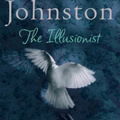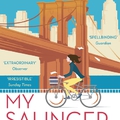Jennifer Johnston: The Gingerbread Woman

I first read about this novel in a post on one of my favorite book blogs. Bridge mentioned once that among other things, novels like this make it worth while to be an English major student. Unfortunately I did not come across this book when I was an English major, but now I thought it surely cannot be a bad book if Bridge praises it so warmly, and the story also seemed interesting, so I decided to read it.
According to the blurb, this is the story of the chance encounter of two people (man and woman, naturally) with damaged pasts. They develop an unusual friendship and finally with the help of each other become capable of facing the pains of their pasts and perhaps start a new life.
I have to admit that I am a sucker for such intimate, very human stories about average characters with damaged pasts. Of course I am always afraid that I run into some abhorrent kitsch about the magical healing powers of love or some similar topic, but I also always hope that perhaps this one will be something different – a truly beautiful and unobtrusive story which will find its way to my heart.
To my great delight, I quickly found that The Gingerbread Woman belongs to the second category. This is a heart-rending and painful story, so life-like that it is almost too hard to bear, but amidst all the pain it manages to convey in a slightly paradoxical way that perhaps hope indeed springs eternal.
It is not my intention to write down in detail the traumas the protagonists, Clara and Lar have to deal with, as it is exactly the main driving force and topic of the novel how – through a series of roundabouts – they manage to face up to the past and say at least to themselves what is torturing them. When they finally succeed in this, it is a great relief both for them and for the reader – we might as well call it a cathartic moment.
By the way it is highly interesting how very differently Lar and Clara choose to fight with their pasts. Lar claims that he does not want to forget his pain, does not want to be healed, and his only desire is that he is left alone to hate the whole world in peace, while Clara attempts to be optimistic and can hardly wait until her pain is gone, so that she might be able to laugh again. Contrary to what we may expect, it is Lar who tells his story (or parts of his story) compulsively to everyone coming his way, but he refuses to listen to the sympathetic words he gets in return. Clara, on the other hand, keeps her story a secret as much as possible, and finally gets rid of her memories by writing them down as notes for a novel, that is, she fictionalizes her life.
Despite the fact that the motif of novel-writing (which usually gives a touch of literariness to any novel) appears in the book, The Gingerbread Woman remains on the ground throughout. It is especially the Lar's life which is strongly influenced by the history of his home country, Northern Ireland, but Clara herself is not the kind of heroine either who stands apart from her present and reality, and tries to spice up her boring life with imaginary ailments.
Although the novel does not deal with particularly pleasant themes, it appealed to me very much all the same. I took to Clara and Lar very much, and I wanted to know as much as possible about their lives. I was almost desperate to continue whenever I had to stop reading. It does not happen to me often nowadays but I got to like the protagonists so much, I found them so strong and realistic characters that it was hard for me to believe at the end of the novel that the story is over and I will never get to know more about them.
Even though the whole novel is exquisite, the end is particularly so: it answers some questions and indicates some directions in which the life of the protagonists is likely to go, but it also leaves several options open. It seems that nothing is entirely black, but it cannot be taken for granted either that everything will turn out all right in the end. And I believe it is a great achievement that the author did not feel an urge to finish the story with a happy end, but did not feel it necessary to torture her characters to death either. Jennifer Johnston seems to have found the perfect balance between suffering and hope, and created a truly wonderful novel.





